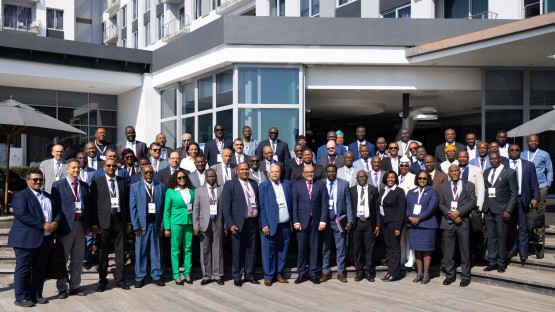Participants at this year’s annual Regional Meeting of Vice Chancellors, held from 14–16 August in Johannesburg, South Africa, agreed on a comprehensive roadmap to establish and implement post-graduate academic programmes in nuclear science and technology in accredited universities in Africa. Vice Chancellors of 27 African universities agreed on concrete measures to enhance collaboration between universities to increase opportunities in tertiary education and to maximize the contribution of nuclear science and technology to socio-economic development in the region. IAEA participants also presented the IAEA’s human resource development strategy.
"Education and training in nuclear science is crucial to enabling Africa to maximize the full potential of nuclear technology for its development. The establishment of these new academic programmes in nuclear science and technology at African universities will ensure we train a critical mass of young graduates for this purpose,” said Zizamele Mbambo, Deputy Director General of the Department of Mineral Resources, at the opening of the meeting. Other key speakers at the event included Lerato Makgae, South African National Liaison Officer to the IAEA, and Shaukat Abdulrazak, Director of the IAEA’s Technical Cooperation Department’s Division for Africa.
Meeting participants examined the status of postgraduate academic programmes in nuclear science and technology at the country level. The attending Vice Chancellors presented overviews of the academic offerings of their institutions, with a view to identifying any gaps in coverage. The development of curricula in agriculture and radiopharmacy were highlighted as priority areas for collaboration.
“For many countries in Africa, the ability to apply nuclear science and technology to address development challenges is limited by a shortage of qualified professionals. These gaps in capacity are due in part to a lack of relevant accredited academic programmes in African universities,” explained Shaukat Abdulrazak, Director of the IAEA Technical Cooperation Department’s Division for Africa.
Key recommendations from the meeting included keeping universities informed of open applications for post-graduate academic programmes and providing Vice Chancellors with examples of IAEA-developed curricula, as well as with the opportunity to have proposals for new curricula reviewed by international experts. This support will enhance the region’s academic landscape by both fostering the creation of new postgraduate nuclear science programmes at accredited universities in Africa and supporting existing efforts.
Since 2018, the IAEA has brought together the Vice Chancellors of African universities through a series of regional meetings, organized to encourage the development of more market- and research-oriented academic curricula and training programmes. These programmes would allow tertiary academic institutions to respond more effectively to the pressing human resource development demands on the continent.
The last session of the 2023 meeting included a visit to South Africa’s North-West University, where delegates learned more about South Africa’s available academic programmes, and were able to reflect further on the suggestions and plans for improvement that were discussed during the assembly.






